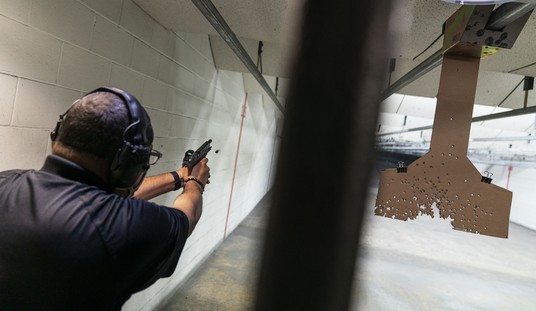The Dempster family thought they were moving to a little slice of heaven when they unpacked their belongings and settled in to their new home in Lower Alsace, Pennsylvania earlier this year. The quiet location was just a few minutes away from all the amenities that Lower Alsace and nearby Reading have to offer, but was still rural enough that they could set up a small range on their property where they could safely enjoy exercising their Second Amendment rights.
It sounds perfect, but the Dempsters say they’ve been put through hell over the past several months because of their range. Neighbors have complained about the sound of gunshots, and just a few weeks ago the township approved new zoning ordinances that will prohibit the family from ever using their range again; requiring private ranges to be permitted by authorities and limiting their existence only to properties larger than five acres found within a small rural conservation district.
“What about the safety of everybody else’s shooting? Who is investigating that? Why is it us they’re coming after? What, Black people can’t shoot and it be safe?” Al Dempster said. “This is definitely about race. When we came to the meeting, everybody was staring at us like they couldn’t believe we are Black.”Township manager Don Pottiger said residents told the township the complaints were motivated by safety concerns after hearing high-powered weapon shots.“As far as I know, nobody came up and said, ‘We don’t like them because they’re not caucasian,’” Pottiger said. “What they did say was, ‘We’re fearful because we hear these high-powered shots and we’re concerned about being able to sit out on our property and not be struck by those weapons.’ The first time I saw the family was at the meeting, and yes, they are non-Caucasian, but I don’t think that had anything to do with why this was pursued.”He said he reached out to the Dempsters when the complaints first began to set up a meeting with township officials and discuss solutions but they declined.Al Dempster said his family was contacted by township officials and declined the meeting because they felt they were under no obligation to discuss shooting at the range, as they believed it is within their rights as property owners.
“Everything that we do is a problem,” said Al Dempster, owner of the Wolters Lane property and gun range. “There are other people in the neighborhood that shoot. But the thing is, when we’re shooting, all of a sudden it’s unsafe.”… Complaints about rampant shooting on the property began in May, according to township officials.Police were called to investigate over the summer but found no evidence of illegal activity.“We didn’t find anything other than they were shooting at a range they’d set up,” said Ray Serafin, chief of the Central Berks Police department, which covers the township.Dempster’s sister Victoria Drayton said residents’ claims of unsafe shooting at all hours amount to a misrepresentation.“The police came here on several occasions,” Drayton said. “They said, ‘We can’t fine you guys, we can’t do anything’ because what we’re doing is legal.”Dempster and Drayton denied that shooting was done outside of township-approved hours at the time.At the time of the shooting complaints, guns could be fired in the township starting two hours after sunrise, and shooting had to stop an hour before sunset.In a statement given to the township before the vote, Hamill Dempster, also a resident of the property, said he is an NRA-certified range safety officer and built the range to NRA standards to ensure no bullet or bullet fragments would leave the range.“Before I constructed this range, I spent countless hours reviewing the laws and restrictions of the local municipality as well as the state of Pennsylvania,” Hamill Dempster said. “I am in no way a danger to the community, nor am I being disruptive.”A legal complaint the Dempsters submitted to the township asserts the new rules violate the Second Amendment and contradict state laws and precedents set by the Commonwealth Court banning townships from infringing on constitutional rights.The complaint highlights cases of Pennsylvania municipalities repealing or declining to pursue rules regulating the use or possession of firearms following legal challenges, including three Berks cases in District, Centre and Washington townships.Al Dempster said Lower Alsace’s new gun range rules were pushed through without giving township officials time to consider the legal issues he raised.
In addressing this issue, the parties are directed to discuss in their briefs the following subsidiary matters: ( 1) whether this Court should adopt the two-step framework for addressing Second Amendment challenges utilized by the lower court; (2) whether the core Second Amendment right to possess firearms for self-defense recognized in District of Columbia v. Heller, 554 U.S. 570 (2008), also implies a corresponding right to acquire and maintain proficiency in their use; (3) whether such a corresponding right, if it exists, must extend to one ‘s own home; and (4) the level of scrutiny courts should apply when reviewing enactments that burden individuals’ ability to maintain firearms proficiency.








